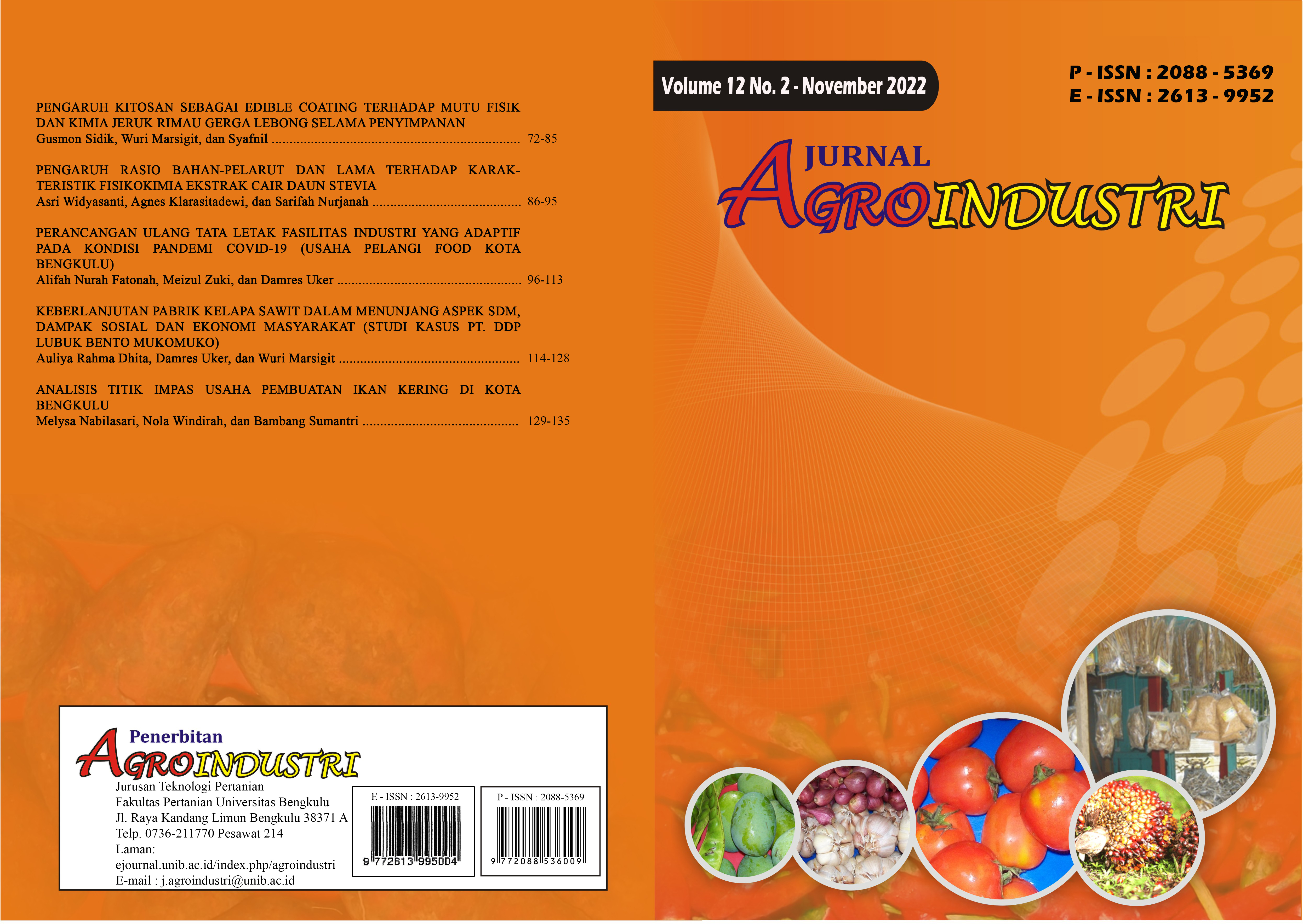Isi Artikel Utama
Abstrak
Kata Kunci
Rincian Artikel
Hak Cipta (c) 2022 Auliya Rahma Dhita

Artikel ini berlisensiCreative Commons Attribution-ShareAlike 4.0 International License.
Authors who publish in this journal agree with the following terms:
- Authors retain copyright and grant the journal right of first publication with the work simultaneously licensed under a Creative Commons Attribution License that allows others to share the work with an acknowledgment of the work's authorship and initial publication in this journal.
- Authors are able to enter into separate, additional contractual arrangements for the non-exclusive distribution of the journal's published version of the work (e.g., post it to an institutional repository or publish it in a book), with an acknowledgment of its initial publication in this journal.
- Authors are permitted and encouraged to post their work online (e.g., in institutional repositories or on their website) prior to and during the submission process, as it can lead to productive exchanges, as well as earlier and greater citation of published work (See The Effect of Open Access).
- This work is licensed under a Creative Commons Attribution-ShareAlike 4.0 International License.
Referensi
- Bintarto, 1983. Interaksi Desa-Kota dan Permasalahannya. Ghalia Indonesia. Yogyakarta. 366 Halaman
- Cahayani, A. 2005.Strategi dan Kebijakan Sumber Daya Manusia. Jakarta. PT. Indeks. Anggota IKAPI. 1(2): 1-2
- Desai, P., & Chandawarkar, M. R. 2015.CSR Practices and Sustainability of Health Care Organizations. Journal of Exclusive Management Science.4(8): 4–9
- Ngadi, M..N. 2015. Keberlanjutan Perkebunan Kelapa Sawit Di Indonesia Dan Prospek Pengembangan di Kawasan Pebatasan. Jurnal Agribisnis Indonesia. 43(1): 17-32
- McKenna dan Beech. 2000. The Essence of Manajemen Sumber Daya Manusia. diterjemahkan Totok Budi Santosa. Yogyakarta. 249 Halaman
- Ranjabar, J. 2013. Sistem Sosial Budaya Indonesia Suatu Penerapan . PT. Ghalia Indonesia. Bogor. 262 Halaman
- Rangan, K., Chase, L. A., & Karim, S. 2012. Why Every Company Needs a CSR Strategy and How to Build It.Journal of Exclusive Management Science. 7(2): 367-368
- Simamora, Henry. 2004. Manajemen Sumber Daya Manusia. Cetakan 3 STIE YKPN. Yogyakarta. 3(1) : 63-73
- Sugiyono. 2009. Metode Penelitian Bisnis Pendekatan kuantitatif, kualitatif dan R&D. Alfabeta. Bandung. 18(2) : 89-97
- Sumarto, S., & Suryahadi, A. 2004. Trade, Gowth, and Poverty In Indonesia. National Conference Of The University Outreach Network. Bogor. 30 Halaman.
- Untung, B. 2007.Corporate Social Responsibillity Perusahaan. Grafika Offset. Jakarta. 18 (1): 76-80
- Warhust, A. 20020. Sustainabillity Indicators And Sustainabillity Performance Management. Warwick Business School. Inggris. 5(2) : 100-101
- Widodo, T. 2007. Perencanaan Pembangunan. UPP STIM YKPN. Yogyakarta. 2(2) : 1-5
Referensi
Bintarto, 1983. Interaksi Desa-Kota dan Permasalahannya. Ghalia Indonesia. Yogyakarta. 366 Halaman
Cahayani, A. 2005.Strategi dan Kebijakan Sumber Daya Manusia. Jakarta. PT. Indeks. Anggota IKAPI. 1(2): 1-2
Desai, P., & Chandawarkar, M. R. 2015.CSR Practices and Sustainability of Health Care Organizations. Journal of Exclusive Management Science.4(8): 4–9
Ngadi, M..N. 2015. Keberlanjutan Perkebunan Kelapa Sawit Di Indonesia Dan Prospek Pengembangan di Kawasan Pebatasan. Jurnal Agribisnis Indonesia. 43(1): 17-32
McKenna dan Beech. 2000. The Essence of Manajemen Sumber Daya Manusia. diterjemahkan Totok Budi Santosa. Yogyakarta. 249 Halaman
Ranjabar, J. 2013. Sistem Sosial Budaya Indonesia Suatu Penerapan . PT. Ghalia Indonesia. Bogor. 262 Halaman
Rangan, K., Chase, L. A., & Karim, S. 2012. Why Every Company Needs a CSR Strategy and How to Build It.Journal of Exclusive Management Science. 7(2): 367-368
Simamora, Henry. 2004. Manajemen Sumber Daya Manusia. Cetakan 3 STIE YKPN. Yogyakarta. 3(1) : 63-73
Sugiyono. 2009. Metode Penelitian Bisnis Pendekatan kuantitatif, kualitatif dan R&D. Alfabeta. Bandung. 18(2) : 89-97
Sumarto, S., & Suryahadi, A. 2004. Trade, Gowth, and Poverty In Indonesia. National Conference Of The University Outreach Network. Bogor. 30 Halaman.
Untung, B. 2007.Corporate Social Responsibillity Perusahaan. Grafika Offset. Jakarta. 18 (1): 76-80
Warhust, A. 20020. Sustainabillity Indicators And Sustainabillity Performance Management. Warwick Business School. Inggris. 5(2) : 100-101
Widodo, T. 2007. Perencanaan Pembangunan. UPP STIM YKPN. Yogyakarta. 2(2) : 1-5
